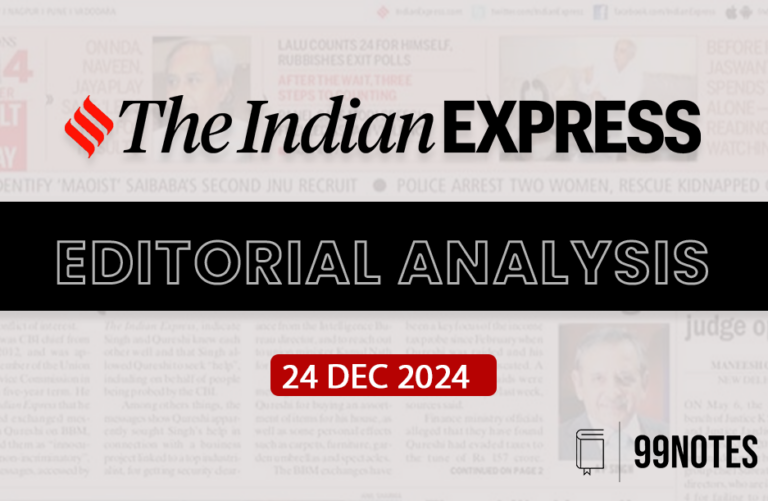13 December 2024 : The Hindu Editorial Analysis
1. The missing spotlight on urban local government polls
(Source – The Hindu, International Edition – Page No. – 8)
| Topic: GS2 – Indian Polity |
| Context |
|
Urban Local Governments and the 74th Constitutional Amendment Act
- Urban local governments (ULGs) are decentralized units responsible for delivering civic services and ensuring quality of life for citizens.
- The 74th Constitutional Amendment Act (CAA), introduced in 1992, codified the role of ULGs.
- Despite its introduction over 30 years ago, the objectives of the amendment remain unrealized.
Elections to ULGs and One Nation One Election (ONOE)
- The ongoing discussion on simultaneous elections (ONOE) provides an opportunity to address the need for regular ULG elections.
- Previous reports, such as the 79th Parliamentary Standing Committee Report (2015) and the NITI Aayog Discussion Paper (2017), excluded ULGs, citing logistical challenges and their status as State subjects.
- The High-Level Committee (HLC) constituted by the Government of India, however, recommended synchronizing local body elections with national and state elections within 100 days.
Importance of ULGs in Urban India
- India has over 4,800 ULGs, serving nearly 40% of the population, a figure projected to exceed 50% by 2050.
- Cities contribute over 60% to India’s GDP and play a critical role in economic growth and cultural well-being.
- Regular ULG elections every five years are vital for ensuring effective governance and development in urban areas.
Delays and Challenges in ULG Elections
- Elections to municipalities are frequently delayed, violating the constitutional mandate for elections every five years.
- According to the Comptroller and Auditor General (CAG) report (November 2024), over 60% of ULGs experienced election delays, leaving them under state government control.
- Delays hinder citizen representation, weaken accountability, and undermine the principle of decentralization.
Post-Election Delays in ULG Functionality
- After election results are declared, operationalizing elected councils faces delays, as seen in Karnataka, where councils formed 11 months after elections on average.
- This reduces elected councillors’ ability to address development needs, leaving ULGs under state government control.
Disempowerment of State Election Commissions (SECs)
- SECs, responsible for conducting ULG elections, face significant challenges.
- The CAG report found that only four out of 15 states assessed empower their SECs to undertake ward delimitation.
- Delays in delimitation and reservation processes by state governments and court cases exacerbate election delays.
Path Forward for ULG Election Reforms
- A holistic analysis of challenges in ULG elections is critical for advancing electoral reforms.
- The HLC’s recommendations and the Government of India’s proposal for an implementation group offer a promising start.
- Nationwide consultations and collaborative efforts by Union and State governments are essential to ensure timely elections and strengthen local democracy.
| PYQ: The states in India seem reluctant to empower urban local bodies both functionally as well as financially. Comment. (150 words/10m) (UPSC CSE (M) GS-2 2023) |
| Practice Question: Discuss the challenges in conducting timely elections for Urban Local Governments (ULGs) in India. Suggest measures to address these issues and ensure the realization of the 74th Constitutional Amendment Act’s objectives. (150 Words /10 marks) |





